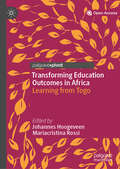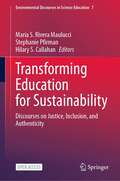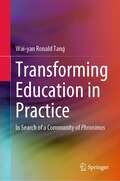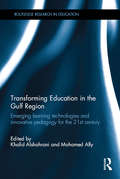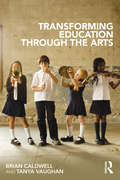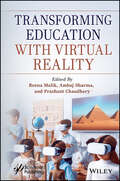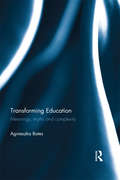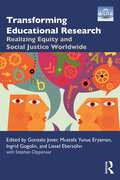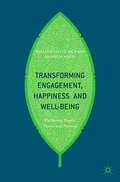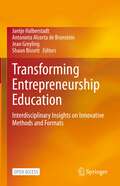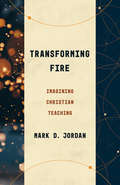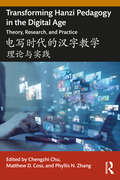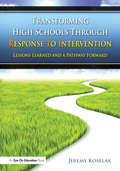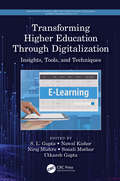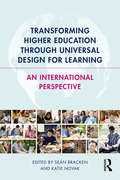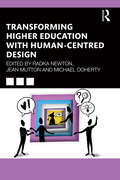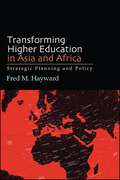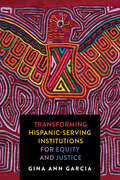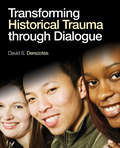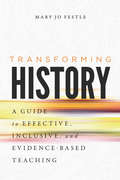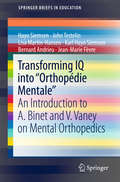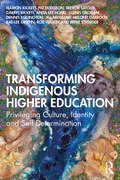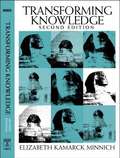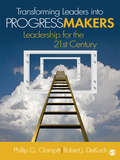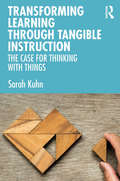- Table View
- List View
Transforming Education Outcomes in Africa: Learning from Togo
by Mariacristina Rossi Johannes HoogeveenGood education changes lives. It is therefore unsurprising that improved schooling plays a central part in most development strategies. At the same time, the expansion of school attainment alone is not sufficient to guarantee improved welfare. This book focuses on one country in West Africa, Togo, to explore what a country that has successfully increased enrollment rates can do to enhance learning outcomes. The authors explore different avenues for improvement, including enhancing the efficiency with which resources are used; increasing the qualifications of teachers; and through greater community involvement in school management. There is scope for improvement along all these dimensions, yet changes at the margin are insufficient to bring about the transformation needed to bring about acceptable levels of learning.Important reading for anyone interested in understanding the pathways to improving the education system in Togo and other developing countries.
Transforming Education for Sustainability: Discourses on Justice, Inclusion, and Authenticity (Environmental Discourses in Science Education #7)
by María S. Rivera Maulucci Stephanie Pfirman Hilary S. CallahanThis book investigates how educators and researchers in the sciences, social sciences, and the arts, connect concepts of sustainability to work in their fields of study and in the classrooms where they teach the next generation. Sustainability, with a focus on justice, authenticity and inclusivity, can be integrated into many different courses or disciplines even if it is beyond their historical focus. The narratives describe sustainability education in the classroom, the laboratory, and the field (broadly defined) and how the authors navigate the complexities of particular sustainability issues, such as climate change, water quality, soil health, biodiversity, resource use, and education in authentic ways that convey their complexity, the sociopolitical context, and their hopes for the future. The chapters explore how faculty engage students in learning about sustainability and the ways in which working at the edge of what we know about sustainability can be a significant source of engagement, motivation, and challenge. The authors discuss how they create learning experiences that foster democratic practices in which students are not just following protocols, but have a stake in creative decision-making, collecting and analysing data, and posing authentic questions. They also describe what happens when students are not just passively receiving information, but actively analysing, debating, dialoguing, arguing from evidence, and constructing nuanced understandings of complex socioscientific sustainability issues. The narratives include undergraduate student perspectives on what it means to engage in sustainability research and learning, how students navigate the complexities and contradictions inherent in sustainability issues, what makes for authentic, empowering learning experiences, and how students are encouraged to persevere in the field.This is an open access book.
Transforming Education in Practice: In Search of a Community of Phronimos
by Wai-yan Ronald TangThis book inspires educational practitioners with special regard to the way how practice in the frontline service is able to inform leadership and policy decision. It empowers them to identify what features are counted as professional and how they could be turned into sources for developing wise judgment and eliciting creative acts in teaching, lesson planning and course design, collaboration, and knowledge excavation to shape policy decision and planning. In addition, for those who are used to conceive the world and their practice from a positivist tradition may find the insights of this book illuminating particularly when they are looking for a paradigm shift in understanding their practice. Last but not least, educators and teacher educators in particular will find the ideas in this book more promising in escalating the awareness of teachers of the next generation towards what is ‘good’ (phronesis) in terms of their professional attitude and actual performance (informed by both techne and episteme) in their relevant settings.
Transforming Education in the Gulf Region: Emerging Learning Technologies and Innovative Pedagogy for the 21st Century (Routledge Research in Education)
by Mohamed Ally Khalid AlshahraniCountries in the Arab Gulf are currently experiencing some of the fastest rates of growth and progress in the world. Transforming Education in the Gulf Region argues that education systems in these countries need to use innovative pedagogies and best practices in teaching and learning to educate all citizens so that they obtain the knowledge and skills to be productive members of society. This book will contribute to the transformation of education in the Gulf countries by suggesting best practices, research outcomes and case studies from experts in the Gulf region. It has become increasingly evident in recent years that Gulf countries need to use emerging learning technologies to cater for the needs of learners and to provide maximum flexibility in learning. There is also a growing practical need to use electronic technologies, since learning materials are more widely available in electronic formats than in paper-based formats. This book focuses on the role of emerging technologies and innovative pedagogies in transforming education in six Gulf countries in the region (Saudi Arabia, United Arab Emirates, Kuwait, Qatar, Oman and Bahrain). With contributions from experts around the world, the book argues that the time is right for Arab Gulf countries to make the transition to electronic learning and that they need to implement the outcomes of research and adopt best practices to transform and revolutionize education to prepare learners in the Gulf region for the 21st Century. The book should be of interest to academics and students in the areas of higher education, learning technologies, education policy and education reform. It should also be of interest to educators and policymakers in the Gulf region.
Transforming Education through the Arts
by Brian Caldwell Tanya VaughanThis timely book takes up the challenge of maintaining programs in the arts in the face of unrelenting pressure from two directions; the increasing focus on literacy and numeracy in schools, teamed with the cut-backs in public funding that often affect the arts most severely. Drawing on the wealth of evidence already available on the impact of the
Transforming Education with Virtual Reality
by Prashant Chaudhary Reena Malik Ambuj SharmaTRANSFORMING EDUCATION WITH VIRTUAL REALITY The book provides an in-depth and comprehensive knowledge reviewof the use of virtual reality in the education industry and businesses. Virtual reality (VR) technology has thoroughly transformed education by providing engaging and immersive ways for students to experience their education and by offering visual learning, creative development, etc., to enhance their studies. Moreover, with increasing accessibility, both students and educators can utilize it for effective teaching and learning. By embracing this VR-related technology, teachers can transform traditional classrooms into lively ones. Businesses can also leverage VR for skilling, up-skilling, and re-skilling. This book is divided into two parts. Part I discusses the opportunities, challenges, and application of VR technology, and Part II focuses on reimagining education with the metaverse. Readers will find in this book: a description of the relationship between virtual reality and student behavior; a review of VR-enabled tools and techniques for an immersive environment; a discussion on VR in the context of vocational education by developing a conceptual framework and roadmap for its adoption; an overview of the advantages, disadvantages, and mechanisms of VR through a detailed analysis showing a comparison of the strong and weak points of the technologies being used in education; a look at the future of learning in the context of VR; a description of the relevance of VR in emerging economies with the help of bibliometric analysis and discusses its future potential; a review of Metaverse as a new education avatar showcasing diverse educational experiences and how to reimagine teaching; an explanation of the relevance of emerging digital technologies in upskilling employees in fashion retail to impart an immersive experience for customers; a proposed framework for mapping the use of VR for students with autistic spectrum disorder (ASD). Audience The book is designed for information technologists, educational researchers, teachers, policymakers, government officials, and business managers.
Transforming Education: Meanings, myths and complexity
by Agnieszka BatesTransforming Education challenges the current global orthodoxy that ‘educational transformation’ can be achieved through a step-by-step implementation of centralised, performance-based strategies for school improvement. Complex responsive processes theory is utilised in an original way to critique leadership myths and explore the alternative, deeper meanings of educational transformation. The theory opens up new forms of understanding about how ordinary practitioners negotiate the meanings of ‘improvement’ in their everyday practice. It is in the gap between the emergence of these local interactions and the predetermined designs of policy-makers that educational transformation can be lost or found. This book is an essential read for education professionals and students interested in the fields of complexity, education policy, leadership and management.
Transforming Educational Research: Realizing Equity and Social Justice Worldwide
by Mustafa Yunus Eryaman Liesel Ebersöhn Ingrid Gogolin Gonzalo Jover Stephan DippenaarIn an era marked by both persistent and emerging challenges, Transforming Educational Research: Realizing Equity and Social Justice Worldwide offers a comprehensive exploration of the dynamic landscape of education and educational research. It delves into the multifaceted issues faced by educators and policymakers worldwide, from the disruptions caused by the global pandemic to the rapid integration of digital technologies.With contributions from diverse regional, theoretical, and methodological perspectives, this volume provides insights into contemporary educational strategies and practices, the crucial role of socio-emotional development, the transformations occurring in higher education, and the impact of global educational policies. It is organized into four thematic clusters, each addressing a specific dimension of the challenges faced by education systems globally. The first cluster focuses on educational strategies and practices, examining approaches to creating conducive teaching and learning environments. The second cluster highlights the socio-emotional dimensions in education, emphasizing the importance of fostering emotional well-being and cultural understanding. The third cluster explores the complexities of higher education, particularly in the context of sustainability, digital transformation, and academic publishing. The final cluster delves into policy perspectives in education, analyzing the influence of globalization and the implementation of learning theories.By fostering dialogue and critical reflection, this book offers a rich tapestry of insights into the common challenges faced by education systems worldwide. It serves as a valuable resource for educators, policymakers, researchers, and anyone interested in creating equitable, inclusive, and effective education systems for all.
Transforming Engagement, Happiness and Well-Being
by William Scott-Jackson Andrew MayoThis book aims to help leaders maximise the engagement of employees and citizens by exploring the impact of a process of active enthusiasm (PACE). Engagement of employees has long been recognised as a key factor for organisational and national success. Yet, worldwide, engagement levels languish at only 25%. Providing a practical model, developed from in-depth global research, the authors show that engagement is continuous and cannot be assessed by annual surveys. Instead it demonstrates that it is specific to individuals and will only increase if employee perceptions are improved. Readers will discover how the PACE process model can be used to maximise employee engagement through the modification of primary causal factors, and consequently generate direct outputs such as increased productivity and reduced absenteeism. Transforming Engagement and Wellbeing provides an invaluable set of tools to help leaders enthuse their people and to improve individuals’ optimism and propensity for engagement, making it essential reading for academics interested in human resource management, as well as managers, leaders and policy-makers.
Transforming Entrepreneurship Education: Interdisciplinary Insights on Innovative Methods and Formats
by Jantje Halberstadt Jean Greyling Antonieta Alcorta de Bronstein Shaun BissettThis open access book provides selected teaching approaches, supporting methods, concrete examples of curricula as well as extracurricular teaching formats, which are predominantly tailored to both African and German requirements. These approaches were developed by the YEEES Training and Research Centers, an international interdisciplinary network of university teachers and researchers from Germany and southern Africa, and combine the fields of management, entrepreneurship, information and communication technologies (ICT), and sustainability. The book shows how current scientific results can be integrated into teaching, how students can contribute to research while learning, and how research can contribute to the development and evaluation of new formats. It is thus relevant for university teachers, researchers, students as well as practitioners who want to educate and act as future change agents.
Transforming Fire: Imagining Christian Teaching (Theological Education between the Times)
by Mark D. Jordan&“We don&’t need books about teaching so much as books that teach.&” Considering Jesus himself taught in a variety of ways—parable, discussion, miracle performance, ritual observance—it seems that there can be no single, definitive, Christian method of teaching. How then should Christian teaching happen, especially in this time of significant change to theological education as an institution? Mark Jordan addresses this question by first allowing various depictions and instances of Christian teaching from literature to speak for themselves before meditating on what these illustrative examples might mean for Christian pedagogy. Each textual scene he shares is juxtaposed with a contrasting scene to capture the pluralistic possibilities in the art of teaching a faith that is so often rooted in paradox. He exemplifies forms of teaching that operate beyond the boundaries of scholarly books and discursive lectures to disrupt the normative Western academic approach of treating theology as a body of knowledge to be transmitted merely through language. Transforming Fire consults writers ranging from Gregory of Nyssa to C. S. Lewis, and from John Bunyan to Octavia Butler, cutting across historical distance and boundaries of identity. Rather than offering solutions or systems, Jordan seeks in these texts new shelters for theological education where powerful teaching can happen and—even as traditional institutions shrink or vanish—the hearts of students can catch fire once again.
Transforming Hanzi Pedagogy in the Digital Age: 电写时代的汉字教学: 理论与实践
by Chengzhi Chu Matthew D. Coss Phyllis N. ZhangTransforming Hanzi Pedagogy in the Digital Age 电写时代的汉字教学 brings together expert researchers and practitioners to offer a coherent theoretical, empirical, pedagogical, and experiential justification for a shift in pedagogical focus from handwriting to e-writing in L2 Chinese pedagogy.This volume argues for a pedagogy based on the 21st century communicative needs of L2 Chinese users, grounded in empirical research as well as practical and lived experiences. The authors propose an “e-writing as primary” (电写为主,手写为辅) framework for L2 Chinese instruction in the 21st century, a transformational proposal which will fundamentally shift the pedagogical focus of L2 Chinese instruction globally towards more learner-centered, research-informed practice. This volume includes three theoretical foundation chapters, four empirical studies, three descriptions of program-level implementation, and ten expert L2 Chinese user vignettes, which, taken together, offer a thorough introduction to e-writing for the future of L2 Chinese teaching and learning.This book will be informative for Chinese language instructors, researchers, program directors, materials developers, and advanced graduate students in both CFL and CSL contexts worldwide.
Transforming High Schools Through RTI: Lessons Learned and a Pathway Forward
by Jeremy KoselakSimplify your approach to implementing Response-to-Intervention (RTI) and make strides toward improved achievement in your high school. In this book, experienced educator Jeremy Koselak shows high school leaders how to attain measurable results through a framework of tiered, dynamic intervention strategies known as RTI. With an awareness of the challenges unique to implementing RTI in high schools, the author explains many of the best policies for continuous improvement. Strategies highlight essential steps for successfully implementing RTI and present a pathway for avoiding common pitfalls. Unique features of this book include: An updated synthesis of high school level RTI recommendations derived from an assortment of research. A frank discussion on the practical concerns and limitations associated with implementing RTI in high schools An illustration of how to embed data-based decision-making into a school's culture Templates and figures demonstrating high school samples Reflections and case studies for actual high schools And more!
Transforming Higher Education Through Digitalization: Insights, Tools, and Techniques (Demystifying Technologies for Computational Excellence)
by S. L. Gupta Nawal Kishor Niraj Mishra Sonali Mathur Utkarsh GuptaHigher education is dynamic, constantly adapting to meet the requirements of students and industry. Transforming Higher Education Through Digitalization: Insights, Tools, and Techniques provides insights from experienced academicians on the digitalization of education and its appropriateness for enhancing the quality of teaching in institutions of higher education. The book also provides insights on technologies used in digital education, the competencies and skills required by teachers and students, managing quality of education through online modes, MOOCs (Massive, Open, Online Courses), and methods to support teachers and instructors in online education. The book also enables teachers and instructors to help students develop the knowledge and skills they need in a digital age and enable them to build collaborative learning that will bring them success. Written for educators, students, and policy makers of higher education, this book demonstrates how to transform traditional education to digital education and to continue their activities without the requirement of students and teachers meeting each other on campus.
Transforming Higher Education Through Universal Design for Learning: An International Perspective
by Katie Novak Seán BrackenProviding insight into the background, theory and practical applications of Universal Design for Learning (UDL), Transforming Higher Education through Universal Design for Learning: An International Perspective examines and shares best practice in UDL implementation worldwide to provide strategies for strengthening student accessibility, engagement and learning outcomes through the development of flexible learning environments. Drawing upon insightful, research-based contributions from educators and student service specialists in Australia, Belgium, Brazil, Canada, Ireland, Israel, Norway, South Africa, Spain, the UK and all across the USA, this book: considers diversity in the form of disability, minority ethnic groups, gender identities, first generation university students and varying socio-economic backgrounds; brings together key thinkers and actors in the field of UDL and expertly maps its practices to the higher educational domain; explores the multiple means of representation, expression and engagement that combine to create a successful UDL framework. Each chapter not only provides a different perspective of how UDL has helped meet the needs of all students to ensure that education is accessible, culturally responsive and socially just, but also considers how this can then be implemented into higher education environments the world over. This book is a crucial read for those who want to make a positive difference in higher education provision and outcomes.
Transforming Higher Education With Human-Centred Design
by Radka NewtonEncouraging a collaborative and thoughtful approach to the wicked problems facing higher education (HE), this book is a showcase of pioneering educators who believe that well-designed education is good for everyone - learners, teachers, education administrators, the learning organisation and the world.Through case studies, thought pieces and practical advice, this book takes a fresh look at the application of Design Thinking and Service Design in a variety of university contexts. Human-centred design perspectives show up the fact that decades of rhetoric about student-centred learning have often left the student still effectively marginalised from change processes. The reader will encounter ample tools and techniques of design and co-creation that can enhance the student experience, from applicant to alumnus. More importantly, the book sets out, in actionable ways, how we can make our universities more effective at supporting students for success, and to become places where people are more empowered to make those changes. University academics, learning support staff, managers and professional staff, as well as HE policy makers and professional bodies, will appreciate this clear and practical guide to exploring service design in the new context of education.
Transforming Higher Education in Asia and Africa: Strategic Planning and Policy (SUNY series in Global Issues in Higher Education)
by Fred M. HaywardDrawing on over fifty years of on-the-ground experience, Fred M. Hayward's Transforming Higher Education in Asia and Africa analyzes change processes in higher education in eight Asian and African countries. The twelve cases range from the push to upgrade and transform higher education in Afghanistan in the midst of a war, to the successful struggle against apartheid in South African institutions, as well as thwarted efforts in Sierra Leone and Madagascar. Providing both practical lessons learned and hope for communities globally, Hayward demonstrates that higher education change and even transformation, which is more fundamental and structural, can occur even in the most difficult environments. Successful transformation requires well-crafted strategic and budget plans with careful implementation, monitoring, and effective leadership at multiple levels. Yet also critical are a commitment to human development, a desire for freedom and belief in democracy, and recognition that high-quality higher education is essential to national development.
Transforming Hispanic-Serving Institutions for Equity and Justice
by Gina Ann GarciaThe framework to help Hispanic-Serving Institutions transform into spaces of liberation that promote racial equity and social justice.Beyond having over a quarter of their undergraduate students be Hispanic, what makes Hispanic-Serving Institutions (HSIs) uniquely Latinx? And how can university leaders, faculty, and staff transform these institutions into spaces that promote racial equity, social justice, and collective liberation?In Transforming Hispanic-Serving Institutions for Equity and Justice, Gina Ann Garcia argues that in order to serve Latinx students and other students of color, these institutions must acknowledge how whiteness operates across the organization, from the ways that it is governed and how decisions are made to how education and knowledge are delivered. Diversity alone is insufficient for achieving a dynamic learning environment within higher education institutions. Garcia's framework for transforming HSIs into truly Latinx institutions is grounded in critical theories, yet it advances new ways of thinking about how to organize colleges and universities that are actively serving students of color, low-income students, and students from other minoritized backgrounds. This framework connects multiple important dimensions, including mission, identity, strategic purpose, membership, curriculum, student services, physical infrastructure, governance, leadership, external partnerships, and external influences. Drawing on over 25 years of HSI research, Garcia offers unique solutions for colleges and universities that want to better serve their students. With over 550 colleges and universities already eligible for the HSI designation, this book is a must-read for everyone in higher education.
Transforming Historical Trauma through Dialogue
by David S. DerezotesTransforming Historical Trauma, by David S. Derezotes, helps readers understand the causes and treatment of historical trauma at an individual, group, and community level and demonstrates how a participatory, strengths-based approach can work effectively in its treatment. The first to offer a combination of theory, literature review, and practice knowledge on dialogue, this book begins with a definition of historical trauma and transformation, includes the dialogue necessary to aid in transformation (such as self-care, self-awareness and professional self- development). The author proposes six key models of dialogue practice—psychodynamic, cognitive behavioral, experiential, transpersonal, biological, and ecological—and shows how these models can be used to help transform sociohistorical trauma in clients. He then applies these six dialogue models to five common practice settings, including work with community divides, social justice work, peace and conflict work, dialogues with populations across the lifespan, and community therapy.
Transforming History: A Guide to Effective, Inclusive, and Evidence-Based Teaching
by Mary Jo FestleTeaching history well is not just a matter of knowing history—it is a set of skills that can be developed and honed through practice. In this theoretically informed but eminently practical volume, Mary Jo Festle examines the recent explosion of research on the teaching and learning of history. Illuminated by her own work, Festle applies the concept of "backward design" as an organizing framework to the history classroom. She provides concrete strategies for setting up an environment that is inclusive and welcoming but still challenging and engaging. Instructors will improve their own conceptual understandings of teaching and learning issues, as well as receive guidance on designing courses and implementing pedagogies consistent with what research tells us about how students learn. The book offers practical illustrations of assignments, goals, questions, grading rubrics, unit plans, and formats for peer observation that are adaptable for courses on any subject and of any size. Transforming History is a critical guide for higher and secondary education faculty—neophytes and longtime professionals alike—working to improve student learning.
Transforming IQ into “Orthopédie Mentale“: An Introduction to A. Binet and V. Vaney on Mental Orthopedics (SpringerBriefs in Education)
by Hayo Siemsen John Testelin Lisa Martin-Hansen Karl Hayo Siemsen Bernard Andrieu Jean-Marie FèvreThis volume discusses Alfred Binet’s works on pedagogy based on his “Orthopédie Mentale”. Binet had empirically found that his idea of a test of general intelligence could be replaced by a test on “problem areas”. These problem areas were then to be specifically addressed and improved within a relatively short time. As a result, students dramatically improved in their IQ test results. Binet died before he could publish the results. Fortunately, the rector of the school, Victor Vaney, published the results of Binet’s experiments in his school. This volume provides the first English translation of Vaney's publication as well as an introduction to Binet's mostly forgotten late work.
Transforming Indigenous Higher Education: Privileging Culture, Identity and Self-Determination
by Ernie Stringer Pat Dudgeon Marion Kickett Trevor Satour Darryl Kickett Anita Lee Hong Glenis Grogan Dennis Eggington Jill Abdullah Melony Darroch Rae-Lee Griffin Roz WalkerAn engaging guide for future best-practice, this book provides an illuminating account of how the innovative programs of education and research at one Centre for Aboriginal Studies made a demonstrably positive difference in the lives of Indigenous students. Written by the experts involved, the book provides detailed descriptions of these ground-breaking education and research programs that saw an increase in the number of Indigenous graduates emerging from the Centre for Aboriginal Studies at Curtin University. Each chapter documents a different stage in the development and delivery of these programs and demonstrates how innovative and culturally appropriate principles of teaching, learning and organizational processes empowered participants to make a real difference in the lives of their families and communities. The book also addresses the challenges faced by such programs and the counterproductive pressures of market-based economic policies, highlighting the need to create an environment attuned to Aboriginal desires for social justice, self-management and self-determination. As a celebration of genuine success in higher education for Aboriginal and Torres Strait Islander students, and a guide on how to improve practice in the future, this book is an essential resource for all professionals and policy makers looking to make a real difference in the lives of Indigenous peoples.
Transforming Knowledge, Second Edition
by Minnich Elizabeth KamarckThis is a book about how we define knowledge and how we think about moral and political questions. It argues that the prevailing systems of knowledge, morality, and politics are rooted in views that are exclusionary and therefore legitimate injustice, patriarchy, and violence. That is, these views divide humans into different kinds along a hierarchy whose elite still defines the systems that shape our lives and misshape our thinking. Like the first edition of Transforming Knowledge, this substantially revised edition calls upon us to continue to liberate our minds and the systems we live within from concepts that rationalize inequality. It engages with the past fifteen years of feminist scholarship and developments in its allied fields (such as Cultural Studies, African American Studies, Queer Studies, and Disability Studies) to critique the deepest and most vicious of old prejudices. This new edition extends Minnich's arguments and connects them with the contemporary academy as well as recent instances of domination, genocide, and sexualized violence. * Updated to consider recent scholarship in Gender, Multicultural, Postcolonial, Disability, Native American, and Queer Studies, among other fields of study * Revised to include an extended analysis of the conceptual errors that legitimate domination, including the construction of kinds ("genders") of human beings * Revised to include new materials from a variety of cultures and times, and engages with today's contemporary debates about affirmative action, postmodernism, and religion
Transforming Leaders Into Progress Makers: Leadership for the 21st Century
by Phillip G. Clampitt Robert J. DeKochProgress: the focus of a new perspective on leadershipWeaving together original research, novel strategies and tactics, and stories of successful leaders, this book provides insight into how to become a progress-making leader. Written by an academic and a business executive, the book provides actionable ideas grounded in sound research and tested in real organizations. Find out more!1. Click on the Features/New to this Edition tab above for more information about the book.2. Visit the authors′ website for teaching and learning resources: 3. Watch the video! A video touching on some of the issues covered in the book is available on YouTube. This video is a great resource that can be used in the classroom to launch discussion about the nature of leadership.
Transforming Learning Through Tangible Instruction: The Case for Thinking With Things
by Sarah KuhnTransforming Learning Through Tangible Instruction offers a transformative, student-centered approach to higher education pedagogy that integrates embodied cognition into classroom practice. Evidence across disciplines makes clear that people learn with their bodies as well as their brains, but no previous book has provided evidence-based guidance for adopting and refining its practice in colleges and universities. Collecting findings from cognitive science, educational neuroscience, learning theories, and beyond, this volume’s unique approach—radical yet practical, effective yet low-cost—will have profound implications for higher education faculty and administrators engaged in teaching and learning. Seven concise chapters explore how physical objects, hands-on making, active construction, and other elements of body and environment can enhance comprehension, memory, and individual and collaborative learning.
